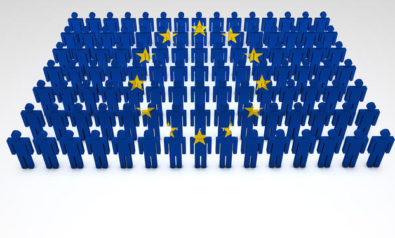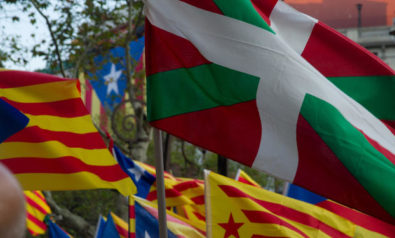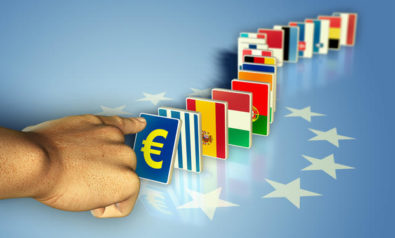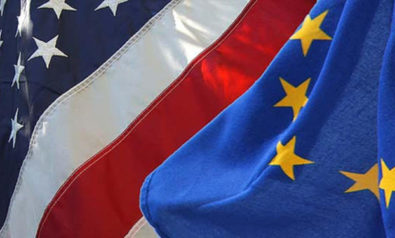How will UK’s exit from the European Union affect the Irish peace process?
One sentence in the recent article in The Economist on Britain’s relationship with the European Union really alarmed me. A “senior Labour figure” was quotedas saying that “Whatever our position on Europe, we cannot be seen as an anti referendum party”. If Labour adheres to that line, the UK, including Northern Ireland, could be out of the EU by 2016.
This is because, in the next British General Election campaign, it would mean that both Labour and the Conservatives would be promising a referendum on whether the UK should leave the EU or not.The parties are being driven to make this promise by the threat of United Kingdom Independence Party (UKIP) to tip the balance in key constituencies. For example if UKIP took even 5% of its vote away from the Conservatives, this could send tens of seats over to Labour, even though, under a proportionally representative electoral system like the one in Ireland these UKIP votes would have transferred back to the Conservatives when the UKIP candidate came to be eliminated. UKIP voters are primarily concerned about immigration and only secondarily do they want Britain out of the EU.
The Conservative plan is to try to renegotiate the terms of UK membership in the EU and put the terms to a referendum. It looks as if Labour may adopt a similar policy, so as to prevent a leakage of its votes to UKIP.
It is very unlikely that the results of any such renegotiation, whether conducted by Labour or the Conservatives, will satisfy British popular expectations. And if that is the case, the UK electorate may choose in a referendum to leave the EU, as a sign of protest against the perceived failure of their own politicians to negotiate a good enough “deal” for Britain.This negotiation is likely to be a disappointment because the expectations in Britain are simply unrealistic. It will not be a negotiation with bureaucrats in “Brussels”.
The results of any renegotiation for Britain would have to satisfy the Governments of every one of the other twenty-sixstates. Britain may want to pay less, but other countries may want it to pay more. Many other EU countries see the very things British negotiators would most like to be rid of – like the working time directive – as part of what they gained, in return for their opening up to the Single Market in the first place. Concessions on these issues will, in particular, be anathema to left leaning Governments, of which there are an increasing number, on the continent. Exempting Britain from the Common Agricultural Policy (CAP), another possible British demand, will get nowhere.
British popular opinion has been constantly led to believe that the EU is a foreign entity, with which Britain has a sort of treaty, and not as what it actually is – a Union of which the UK is a participating member with a vote on every decision. The role of British MEPs, British ministers, and a British Commissioner in EU decisions is ignored. All decisions are presented as emanating from an “unelected” bureaucracy, and the role of “elected” British MEPs and “elected” British ministers in the whole process is passed over as if it never happened.
In the latest poll, 49% of UK citizens say they would vote to leave the EU, and only 32% that they would vote to stay in – a large margin of 17 points.If possible results of a renegotiation are hyped up in the next British General election, and if there is lots of talk of “red lines”, the margin could widen even more, if, as I expect, the actual results of the negotiation then prove to be paltry.
No matter how good the pro-EU arguments might be, when the referendum campaign itself actually starts in earnest, the mountain to climb may simply prove too high. Referenda can deliver surprising results, for which no one has planned. Extraneous issues, anger, and complacency can lead people to vote contrary to their own objective interests. And in the UK case there is unlikely to be a second referendum.
I am particularly worried about the effect of Britain leaving the EU on the fragile situation in Northern Ireland.
Northern Ireland, and its reversible peace process, is being completely ignored in the debate taking place in Britain on whether to have a renegotiation and referendum on the EU. It is also being ignored in Brussels, where the impatience with the British is palpable, and where there is little disposition to accommodate what are seen as unreasonable British demands, being put forward when the EU has far more important things on its mind.
Obviously if the UK leaves the EU, it will negotiate a new relationship with the EU. All sides will agree on that. After all 50% of British exports go the euro zone.
But what sort of relationship will it be?
One of the big drivers of anti-EU sentiment in Britain is immigration of EU citizens from central and eastern European countries, like Romania, Bulgaria, and the Baltics. Gordon Brown famously encountered this sentiment during the last British General Election.
If the UK leaves the EU, it would be entirely free to restrict immigration from these particular EU countries. But as a continuing member of the EU, the Republic of Ireland could not restrict the entry of EU citizens. So if the UK wanted to prevent these EU citizens entering the UK through the Republic, it would have to introduce passport controls at Newry, Aughnacloy, Strabane and on all other roads by which such immigrants could cross the border from the Republic into the UK.
If the UK is outside the EU, tariffs would have to be collected on UK exports entering the Republic. Average EU tariffs are quite low, but some tariffs, on things like dairy products and clothing, are quite high. Customs posts would have to be placed on all roads leading across the border to ensure collection of these tariffs. Smuggling, with all its potential as a funding source for other forms of illegality, would become very profitable again.
But the human and political cost in border counties would be the worst aspect of it. Nationalist communities would again feel cut off from the Republic by the inconvenience of passport controls, and, of course the efforts to market Ireland as a single tourist destination set at naught.
Since Northern Ireland came into being as a separate entity in 1920, the large nationalist minority there has retained a very strong sense of identification with the rest of the island. This reflected itself in constant, and sometimes violent, agitation for separating Northern Ireland from the rest of the UK, and uniting it instead with the rest of Ireland.
Members of the nationalist minority have different religious, sporting, and cultural affiliations to those of the unionist majority. They attend different schools and, in some places, so called “peace walls” have had to be erected to keep them apart. Even in recent weeks, despite the progress that had been made, violent clashes have again erupted over how many times a year the UK flag should fly over Belfast City Hall. Meanwhile dissident IRA members have murdered police and prison officers.
From the 1980’s onwards, immense joint efforts were made by Irish and UK Prime Ministers to devise, and get majority and minority agreement to, arrangements for the governance of Northern Ireland that would bridge the underlying divisions, and reduce the sense of isolation felt by the nationalist minority, while simultaneously respecting the UK allegiance of the majority. During my two and half years as Taoiseach, this work too almost half my time.
This work culminated in the 1998 Good Friday Agreement which eventually brought a new system into being, which has a subtle tripartite balance of cross community power sharing and of ,all Ireland and of British/Irish structures. This was designed to make both nationalists and unionists feel equally “at home” in Northen Ireland.
UK withdrawal from the EU would dig a deep political and economic trench between Northern Ireland and the rest of Ireland.
The possible reintroduction of customs posts, and of immigration controls, would undermine the efforts that have been made , in the Good Friday Agreement, to reduce the divisions between North and South and between Ireland and the UK, which constitute a fragile structure of peace, along fault lines that date back to the seventeenth century.
Given that UK Prime Ministers have had to devote so much time to the so called “Irish Question” for the last 150 years, it is amazing that the current UK debate on EU membership is being conducted either as if Ireland did not exist, or the UK had no interest in it.
Some might say that these fears of the UK having customs posts and passport controls on the Irish border are exaggerated. Such people might think that UK could easily negotiate a free trade and free movement deal with the EU, which would render them unnecessary.
There is a big snag here.
To enjoy continued free access to EU markets for its goods and services, and obviate the need for customs posts, Britain would have to continue to apply EU rules, as now, but WITHOUT having had any say at all in them – something the UK does have as an EU member. This is what Switzerland and Norway have to do. It would also have to continue to contribute to the EU budget, as Norway does. That would be even more annoying to British euro sceptics than the present situation.
Furthermore free movement of people is one of the drivers of anti-EU sentiment in Britain, and UKIP voters would be very dissatisfied with any deal that did not give back to Britain itself the right to decide who could, and could not, work in the UK. And if the UKIP voters got their way on that, passport controls within Ireland on EU citizens crossing from the south(which would be in the EU) into the north (which would be out of the EU like the rest of the UK ) would be necessary.
I believe the Irish diplomatic service, which had remarkable success in the 1980s in laying the foundations for previous Anglo-Irish Agreements, should intensively brief all British MPs on the possible dangers to the settlement we have achieved in Northern Ireland, of setting off a chainof events – including a referendum – that could lead to an unplanned and precipitate exit of Northern Ireland, along with the UK, from the European Union.
Images: Copyright © Shutterstock. All Rights Reserved.
The views expressed in this article are the author's own and do not necessarily reflect Fair Observer’s editorial policy.
Support Fair Observer
We rely on your support for our independence, diversity and quality.
For more than 10 years, Fair Observer has been free, fair and independent. No billionaire owns us, no advertisers control us. We are a reader-supported nonprofit. Unlike many other publications, we keep our content free for readers regardless of where they live or whether they can afford to pay. We have no paywalls and no ads.
In the post-truth era of fake news, echo chambers and filter bubbles, we publish a plurality of perspectives from around the world. Anyone can publish with us, but everyone goes through a rigorous editorial process. So, you get fact-checked, well-reasoned content instead of noise.
We publish 2,500+ voices from 90+ countries. We also conduct education and training programs
on subjects ranging from digital media and journalism to writing and critical thinking. This
doesn’t come cheap. Servers, editors, trainers and web developers cost
money.
Please consider supporting us on a regular basis as a recurring donor or a
sustaining member.
Will you support FO’s journalism?
We rely on your support for our independence, diversity and quality.













Comment